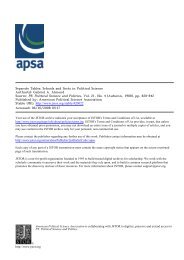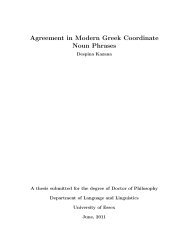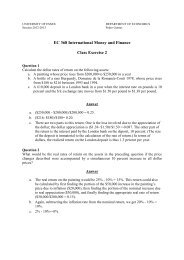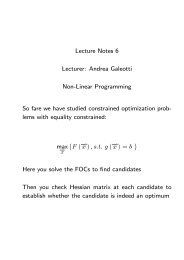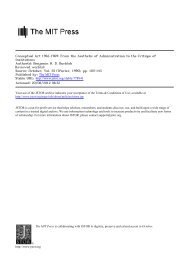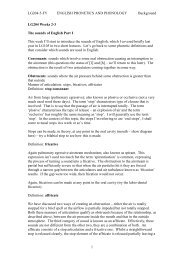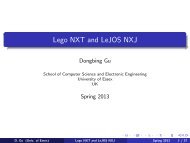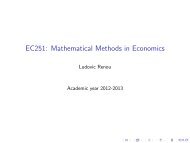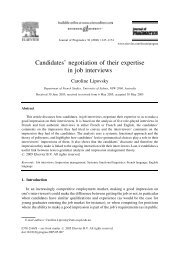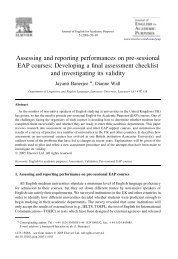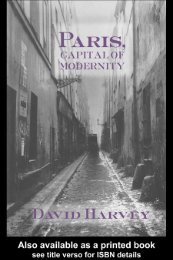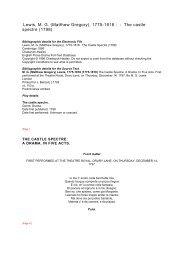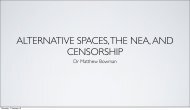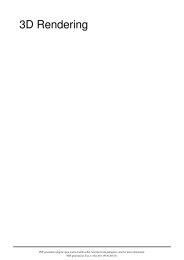PA973-7-FY 2012 - University of Essex
PA973-7-FY 2012 - University of Essex
PA973-7-FY 2012 - University of Essex
Create successful ePaper yourself
Turn your PDF publications into a flip-book with our unique Google optimized e-Paper software.
UNIVERSITY OF ESSEX<br />
Centre for Psychoanalytic Studies<br />
MASTERS IN JUNGIAN AND POST-JUNGIAN STUDIES<br />
Module Co-ordinator: Pr<strong>of</strong>essor Andrew Samuels<br />
<strong>2012</strong>-13<br />
Course: <strong>PA973</strong>-7-<strong>FY</strong>: Key Concepts in Jungian and Post-Jungian Psychology<br />
(<strong>PA973</strong>-7-AU Archetype, Gender, Shadow, Soul, Individuation: Some Key Concepts<br />
in Jungian & Post-Jungian Studies)<br />
(PA907-7-SP What happens in Jungian Analysis? – A series <strong>of</strong> Seminars on the Analytic<br />
Encounter)<br />
The course introduces the central theoretical concepts <strong>of</strong> analytical psychology which<br />
will be located within critical, comparative and experiential perspectives. A further<br />
aim is to introduce students to the general field <strong>of</strong> contemporary post-Jungian<br />
psychology and familiarise them with the relevant literature. The interface between<br />
analytical psychology and psychoanalysis will be foregrounded. In addition,<br />
opportunities will be provided for the theoretical exploration <strong>of</strong> the connection<br />
between these key concepts and their clinical use.<br />
The course will be taught by sixteen analytical psychologists from a variety <strong>of</strong><br />
backgrounds, groups, and theoretical perspectives (biographical notes are provided<br />
with the course pack). Essay titles are to be agreed with the Course Co-ordinator,<br />
Pr<strong>of</strong>essor Andrew Samuels. Details <strong>of</strong> the essay assignment are given at the end <strong>of</strong><br />
this course outline and reading list.<br />
Except where indicated, all the reading is essential and required reading and the<br />
course pack includes everything except extracts from Jung’s Collected Works or<br />
from Jung and the Post-Jungians (Samuels, A [1985], London and Boston: Routledge<br />
and Kegan Paul).<br />
TERM I: Archetype, Gender, Shadow, Soul, Individuation<br />
1. October 10 th <strong>2012</strong>: ANDREW SAMUELS Introduction to the course<br />
2. October 17 th <strong>2012</strong>: NANCY KRIEGER Archetypes and neuroscience<br />
Reading:<br />
Schore, A. (2007) 'Psychoanalytic research: progress and process – developmental<br />
affective neuroscience and clinical practice'. Psychologist-Psychoanalyst,<br />
Summer 2007, pp. 6-15.<br />
Wilkinson, M. (2007) 'Jung and neuroscience'. In A. Casement (Ed), Who Owns<br />
Jung? London and New York: Karnac. (Typescript provided.)<br />
3. October 24 th <strong>2012</strong>: DEIRDRE JOHNSON Gender in analytical psychology:<br />
social construction or innate?<br />
Reading:<br />
1
Jung, C.G. (1928). Anima and Animus in CW7, paras. 296-340.<br />
Young-Eisendrath, P. (1988) ‘Contrasexuality and the dialectic <strong>of</strong> desire’ in Post<br />
Jungians Today, Ed. A. Casement. London: Routledge, pp.198-211.<br />
Roesler, C (<strong>2012</strong>) ‘A revision <strong>of</strong> Jung’s theory <strong>of</strong> archetypes in light <strong>of</strong> contemporary<br />
research: neurosciences, genetics and cultural theory – a reformulation’ in Montreal<br />
2010, Facing Multiplicity: Psyche, Nature, Culture Proceedings <strong>of</strong> the XVII th<br />
Congress <strong>of</strong> the IAAP, Ed. P. Bennett. Switzerland: Daimon Verlag.<br />
4. October 31 st <strong>2012</strong>: ANN CASEMENT The Shadow<br />
Reading:<br />
Casement, A. (2006). The shadow. From The Handbook <strong>of</strong> Jungian Psychology:<br />
Theory, Practice and Application, edited by Renos Papadopoulos. London &<br />
New York: Routledge.<br />
-----. (2010). “Persona” in David Leeming, Kathryn Madden and Stanton Marlan<br />
(Eds), The Encyclopedia <strong>of</strong> Psychology and Religion. New York: Springer.<br />
Jung, C.G, The shadow in Aion, Part 2 <strong>of</strong> The Archetypes and the Collective<br />
Unconscious. CW 9 ii paras 13-19.<br />
Samuels, A., Shorter, B., Plaut. A. Shadow. In A Critical Dictionary <strong>of</strong> Jungian<br />
Analysis. London & New York, Routledge.<br />
Reading Week: November 7 th <strong>2012</strong><br />
5. November 14 th <strong>2012</strong>: MICHAEL WHAN The question <strong>of</strong> the subject and<br />
world soul in archetypal psychology.<br />
Reading:<br />
Hillman, J. (1982). Anima Mundi: The return <strong>of</strong> the soul to he world. Spring:<br />
Archetypal Psychology and Jungian Thought. pp 71-93.<br />
Hillman, J. (1983). The pandemonium <strong>of</strong> images: Jung’s contribution to “Know<br />
Thyself”. In Hearing Fictions. New York: Station Press, pp 53-81.<br />
Hillman, J. (1994). Once more into the fray. Spring: 56, Fall 1994, pp 5-18.<br />
Giegerich, W. (1993). Killings: Psychology’s Platonism and the Missing Link<br />
to Reality. Spring: 54, June 1993, pp 5-18.<br />
Suggested Reading:<br />
Heller, Sophia. (2006). The Absence <strong>of</strong> Myth. New York: State <strong>University</strong> <strong>of</strong> New<br />
York Press.<br />
6. November 21 st <strong>2012</strong>: JEAN THOMSON Archetypes: The Imagined and the<br />
Whole System.<br />
Reading:<br />
Edelman, G. (1992). Consciousness: The Remembered Present, in Bright Air,<br />
Brilliant Fire. Harmondsworth: Penguin.<br />
Grant, M. (1995). The story <strong>of</strong> Cupid and Psyche in Myths <strong>of</strong> the Greeks and<br />
Romans. Harmondsworth: Penguin.<br />
Spielrein, S. (1910). Destruction as a cause <strong>of</strong> coming into Being. Journal <strong>of</strong><br />
Analytical Psychology, 39:2, (1994).<br />
Zinkin, L. (1998). The hologram as a model for analytical psychology. In Dialogue<br />
2
in the Analytic Setting. London: Jessica Kingsley.<br />
7. November 28 th <strong>2012</strong>: JIM FITZGERALD Psychological Types.<br />
Reading<br />
von Franz, M-L. (1971). The inferior function. In Jung’s Typology. New York:<br />
Spring pp 12-72.<br />
Jung, C.G. (1926), General description <strong>of</strong> the types. CW 6, pp 330-407.<br />
8. December 5 th <strong>2012</strong>: PETER ADDENBROOKE Analytical psychology and<br />
religion: the enquiring mind and the blinkers <strong>of</strong> doctrine.<br />
Reading:<br />
Fordham, M. (1985). Is God supernatural? In Explorations into the self. London:<br />
Academic Press. pp 174-184.<br />
Jung, C.G. (1938). The autonomy <strong>of</strong> the unconscious. CW 11, pp 5-33.<br />
9. December 12 th <strong>2012</strong>: ANN SHEARER Myth as methodology.<br />
Reading:<br />
Giegerich, W. (2004) 'The end <strong>of</strong> meaning and the birth <strong>of</strong> man'. Guild <strong>of</strong> Pastoral<br />
Psychology pamphlet.<br />
Shearer A. (2004) On the making <strong>of</strong> myths: mythology in training. Journal <strong>of</strong> Jungian<br />
Theory and Practice, 6: 2, pp. 2-14.<br />
Segal, R. (1998). Introduction to Jung on Mythology (London: Routledge), pp. 4-45.<br />
Please Google and read up on the myth <strong>of</strong> Perseus, or look it up in e.g. Robert<br />
Graves Penguin book on Greek Myths, Volume 1.<br />
TERM II: What happens in Jungian Analysis? – a series <strong>of</strong> seminars on The<br />
Analytic Encounter<br />
10. January 16 th 2013: ANDREW SAMUELS Introduction to the second term <strong>of</strong><br />
the course<br />
11. January 23 rd 2013: DR. GOTTFRIED HEUER The Self and individuation<br />
Reading<br />
Samuels, A, Shorter, B., Plaut, A. A Critical Dictionary <strong>of</strong> Jungian Analysis. London :<br />
Routledge. Entries on ‘individuation’ and ‘self’.<br />
von Franz, M-L. (1964) The process <strong>of</strong> individuation. In Man and His Symbols,<br />
edited by John Freeman. London: Picador (1978)<br />
12. January 30 th 2013: BIRGIT HEUER Aims and objectives <strong>of</strong> Jungian analysis.<br />
Reading:<br />
Stein, M. (1982). The aims and goal <strong>of</strong> Jungian analysis. In Jungian Analysis, edited<br />
by M. Stein. La Salle: Open Court. pp 28-43.<br />
Hillman, J. (1972). Three ways <strong>of</strong> failure and analysis. In The Myth <strong>of</strong> Analysis.<br />
Evanston: Northwestern <strong>University</strong> Press, pp 98-104.<br />
3
13. February 6 th 2013: NICOLA GLUCKSMANN The analytical relationship:<br />
transference and counter-transference.<br />
Reading:<br />
Astor, J. (2001) Is transference the total situation? Journal <strong>of</strong> Analytical Psychology,<br />
46:3.<br />
Joseph, B. (1989). Transference: the total situation. In Psychic Equilibrium and<br />
Psychic Change. London: Tavistock/Routledge. pp 156-167.<br />
Jung, C.G. (1946) The Psychology <strong>of</strong> the Transference. Collected Works, Vol. 16.<br />
Lambert, K. (1981) Transference, counter-transference and interpersonal relations.<br />
Chapter 7 <strong>of</strong> Analysis, repair and Individuation. London: Academic Press.<br />
Recommended further reading:<br />
Note from lecturer: If you have time, start with these more accessible papers and<br />
only then follow with the four classic papers above.<br />
Alister, Ian and Hauke, Christopher. (1998). Contemporary Jungian Analysis.<br />
London and New York. (See especially the chapters by Jean Knox, Fred Plaut<br />
and Christopher Hauke).<br />
Casement, Ann (Ed). (1998). Post-Jungians Today. London and New York:<br />
Routledge.<br />
Mann, David (Ed). Erotic Transference and Counter-Transference. London and<br />
New York: Routledge.<br />
Samuels, Andrew. (1989). The Plural Psyche. London and New York, Routledge.<br />
(See especially chapters 9 and 10).<br />
Yalom, Irvin. (1989/1991). Love’s Executioner and Other Tales <strong>of</strong> Psychotherapy.<br />
London and New York: Penguin Books.<br />
Reading Week: February 13 th , 2013<br />
14. February 20 th 2013: ANDREW SAMUELS The imaginal field<br />
Reading:<br />
Field, N. (1991). Projective identification: mechanism or mystery? Journal <strong>of</strong><br />
Analytical Psychology, 36, 93-109.<br />
Samuels, A. (1989). Counter-transference and the “mundus imaginalis” and The<br />
alchemical metaphor. Two chapters in The Plural Psyche: Personality,<br />
Morality and the Father. London and New York: Routledge.<br />
15. February 27 th , 2013: MARTIN STONE A Jungian approach to dreams.<br />
Reading<br />
Jung, C.G. (1916). General aspects <strong>of</strong> dream psychology. CW8.<br />
Jung, C.G. (1945). On the nature <strong>of</strong> dreams. CW8.<br />
16. March 6 th 2013: MARK SABAN The Question <strong>of</strong> Opposites in Jungian<br />
Psychology.<br />
4
Reading:<br />
Samuels, Andrew. (1985). Jung and the Post-Jungians. London: Routledge &<br />
Kegan Paul, pp. 92-94 and 113-16.<br />
Huskinson, Lucy. (2004). Nietzsche and Jung: The Whole Self in the Union <strong>of</strong><br />
Opposites. New York and Hove: Brunner-Routledge, pp. 35-65.<br />
Hillman, James. (1968). Senex and Puer: An Aspect <strong>of</strong> the Historical and<br />
Psychological Present. Zurich: Rhein-Verlag, pp. 303-16.<br />
Jung, C. G. Collected Works vol. 7, paragraphs 78-92 and 111-20.<br />
-----. Collected Works vol. 14, paragraphs 200-13, 654-62 and 676-80.<br />
17. March 13 th 2013: IAN WILLIAMSON A Post-Jungian Understanding <strong>of</strong><br />
Working with Children<br />
Reading:<br />
Knox, J. , Self-agency and the coercive use <strong>of</strong> language, Journal <strong>of</strong> Analytical<br />
Psychology 2009, 54, 25-41.<br />
Plaut, A. (1956) The transference in analytical psychology. In Technique in Jungian<br />
Analysis. Heinemann, London, 1974.<br />
18. March 20 th 2013: CHRISTOPHER HAUKE Development, archetype and<br />
analytic practice: a critical perspective.<br />
Reading:<br />
Hauke, C. (1996). The child: development, archetype, and analytic practice. San<br />
Francisco, Jung Institute Library Journal, 15, 1, pp 17-38.<br />
INFORMATION ABOUT THE ESSAY ASSIGNMENT<br />
The essay title for this course is as follows:<br />
5
“Write a critical account <strong>of</strong> one concept or theme in analytical psychology that has<br />
been or will be covered on the course.”<br />
Guideline: We expect a definition <strong>of</strong> the concept or delineation <strong>of</strong> the theme, an<br />
assessment <strong>of</strong> its importance, an account <strong>of</strong> its history and development in Jungian<br />
and post-Jungian thought. Comment upon its applicability both clinically and nonclinically<br />
(i.e., in the context <strong>of</strong> therapy and in other contexts). Give your critical<br />
assessment <strong>of</strong> your chosen concept or theme. Parallels with psychoanalysis (or any<br />
other school <strong>of</strong> psychotherapy) should be given where appropriate. Finally, locate the<br />
concept or theme within its wider intellectual and cultural context, making use <strong>of</strong> the<br />
approaches you have encountered in the seminar series “Jung in Contexts”.<br />
The deadline for this essay is Wednesday <strong>of</strong> Week 16 (Year 2, Term 2). The exact<br />
date can be obtained from the Graduate Secretary or Scheme Director, Dr. Kevin Lu.<br />
The length should be not more than 5,000 words.<br />
If you are in any doubt about any aspect <strong>of</strong> the essay assignment, please contact the<br />
Course Co-ordinator, Pr<strong>of</strong>essor Andrew Samuels.<br />
6



